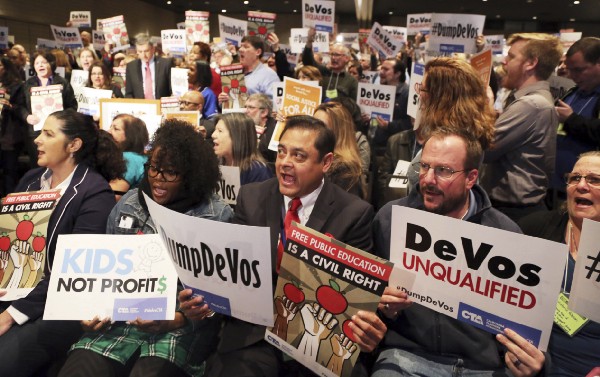by Lindsay Gibbs and Casey Quinlan
Friday marks the 45th anniversary of the passing of Title IX, the federal civil rights law that prevents sex and gender discrimination in education.
Over the past decade, largely under the guidance of President Barack Obama, Title IX has been strengthened. The Obama administration added protections for transgender students and sexual assault victims to the statute, and repealed a Bush-era policy that allowed schools to rely solely on unscientific surveys to “prove” a lack of interest in starting a new women’s sport.
But as Title IX supporters celebrate how much the legislation has accomplished, particularly for women and girls in sports, many who have been closely monitoring the actions of President Donald Trump and his Secretary of Education Betsy DeVos are extremely concerned about its future.
“There’s a sense that Title IX and girls participating in sports and gender equality is a done deal, when in fact the reality is it’s very fragile,” Nancy Hogshead-Makar, an Olympic champion, civil rights lawyer, and founder of Champion Women, told ThinkProgress.
There is evidence from the past few months to suggest that Hogshead-Makar’s warning is not merely hyperbole. Trump’s budget proposal recommends a seven percent budget reduction for the Office for Civil Rights, which would force the department to slash approximately 27 jobs at a time when Title IX complaints are on the rise. The ratio of Title IX cases per investigative staff members in the OCR was 41 to 1 in fiscal year 2016, and that ratio will only become more lopsided if these cuts go into effect.
Additionally, DeVos has named Candice Jackson — a woman who once insisted she faced discrimination because she is white — as the deputy assistant secretary of the Office for Civil Rights. And DeVos has shown no signs that she will fight for members of any marginalized community.
If a law is only as good as its enforcement, then Title IX is in trouble.
The authority of Title IX seems to be trending in the wrong direction, and that could mean bad news for sexual assault victims on college campuses, transgender (and other LGBTQ) students, and equality in athletics.
Sexual assault
In 2001, the OCR issued a guidance that sexual harassment was considered a threat to students’ ability to pursue opportunities in education. In 2011, President Obama expanded that guidance and made it clear that sexual violence was considered sexual harassment.
The expanded guidance requires prompt investigation of the complaint, universities to have an established internal review procedure, and schools to provide accommodations and services to students who have been sexually assaulted. The creation of this guidance coincided with the advocacy work of survivors of campus sexual assault, and an increased public awareness of the epidemic — according to RAINN, 23 percent of female college students are raped or sexually assaulted on campus. Currently, there are 337 sexual violence cases being investigated by the OCR at 238 postsecondary institutions.
DeVos’ attitude towards civil rights investigations of how universities handle sexual assault cases has been murky, at best.
When specifically asked during her confirmation hearing in January if she would uphold the Obama-era guidance, DeVos responded, “It would be premature for me to do that today.”

Five months into the job, she still has not committed to upholding those guidances, and there are plenty of reasons to be concerned that she won’t.
For starters, the Dick and Betsy Devos Family Foundation donated tens of thousands of dollars to a group that has long opposed expanded rights for sexual assault survivors. Then, a couple months ago, the department picked Candice Jackson for deputy assistant secretary of the Office for Civil Rights. Jackson, who can serve in her deputy role without Senate confirmation for 210 days, once called women who accused President Donald Trump of sexual assault “fake victims.”
In April, which happened to be sexual assault awareness month, DeVos met with Earl Ehrhart, a Georgia state representative. Ehrhart recently pushed a bill that would prohibit universities from starting their own investigations unless police already did so, even though groups advocating for sexual assault survivors say that this would simply discourage students from reporting their rapes. It’s understandable, then, that DeVos’ decision to meet with Ehrhart — who told campus rape survivors to “go trigger somewhere else” if they were unhappy with the bill — angered advocates, particularly since DeVos has not responded to requests to meet with sexual assault survivors. (Though she did meet with Michigan’s first lady Sue Snyder to discuss the topic, details of that meeting were not made public.)
“It’s concerning to us and advocates to see the department both be wishy-washy in committing itself to all students’ civil rights and also being willing to sit down with pretty right-wing legislators at a moment when legislators are themselves passing legislation on the state level that would be incredibly harmful to young victims and students,” Mahroh Jahangiri, executive director of Know Your Title IX, told ThinkProgress.
To top things off, last week the department sent a memo to staff members with a directive to only look at individual cases, not systematic patterns of discrimination, when investigating a complaint.
“If you don’t take a systemic approach to these investigations and really look at the patterns then you will miss things.”
According to Jahangiri, limiting the scope of civil rights investigations would certainly harm survivors of sexual assault.
“[Systematic approaches to investigations] really addresses context around individual cases and is able to look at broader kinds of misconduct,” Jahangiri said. “That really helps survivors who are low-income, who don’t have access to legal representation, who still don’t know what their rights are, because those investigations will prompt schools to do better to protect all of their students, rather than a single student who came forward.”
Neena Chaudhry, Director of Education and Senior Counsel at the National Women’s Law Center, agrees.
“If you don’t take a systemic approach to these investigations and really look at the patterns then you will miss things,” Chaudhry said.
LGBTQ rights
DeVos has always been seen as a threat to LGBTQ rights, and her actions so far have proven why. In February, the Trump administration rescinded Education Department guidance on the rights of transgender students to use the bathroom that corresponds with their gender. It was a huge blow to the safety of trans students.
Last week, the OCR released a new guidance for trans students, but it is extremely murky, and does not address bathroom protections.
“[The new guidances for transgender students] are not clear in many ways, things are confusing; it does seem to focus on ways to dismiss complaints,” Chaudhry said.
Although some of the more prominent court cases on transgender student rights, which concerned bathrooms, were listed as investigations that could possibly be dismissed, the memo listed the use of incorrect pronouns and other issues as areas where officers may have jurisdiction. Sharita Gruberg, senior policy analyst for the LGBT Research and Communications Project at the Center for American Progress, said the memo left a lot of ambiguity for educators, parents, and trans students on what rights trans students have. (ThinkProgress is an editorially independent news site affiliated with the Center for American Progress).
“Rescinding the guidance, and then the lack of clarity in the current position, leaves trans students vulnerable to discrimination at schools,” said Gruberg.
“Schools are not really aware of what their obligations are under the law and not everyone has the resources to bring litigation in court. Plus, that takes a while and there is a whole lot of trauma that can be inflicted on students in the meantime.”
This ambiguity is a problem. Hoghshead-Makar said the Obama administration provided a playbook for schools to follow when it comes to transgender students, but that playbook has essentially been ripped to shreds. Now, a population that is already one of the most targeted and maligned, is facing an even more uncertain future.
Athletics
Title IX has become synonymous with sports, and it’s certainly the area where its impact has been most acutely felt. In the 1971–72 school year, girls accounted for only seven percent of all high school athletes, compared to 42 percent today. When Title IX was enacted, there were only 30,000 girls playing sports in college; today, that number is over 214,000. Overall, 2 in 5 girls are playing sports in school now, compared to just 1 in 27 before Title IX.
However, equality is still a long way off; overall, girls still have 1.2 million fewer opportunities to play sports in high school than boys, and are twice as likely as boys to enter sports later in life, drop out of sports earlier in life, and be inactive overall.
When it comes to the OCR, a whopping 80 percent of the Title IX complaints filed have to do with equality in sports. Based on simple math alone, the proposed budget reduction in the OCR would have the biggest impact on the office’s ability to investigate discrimination in athletics.
That is not good news for girls of color in particular, considering that demographic is already underserved by athletics. In schools that are 90 percent or more minority, girls receive just 39 percent of the athletic opportunities that girls in schools that are heavily white receive. And that’s not good news for the success of women everywhere; while many might dismiss sports as just a game, at the grassroots level, participation in sports has a direct correlation to physical health and success later in life.
“In a survey of 400 women executives, 52% of C-suite women played sport at the university level, compared to 39% of women at other management levels,” Laura Gentile, Senior Vice President of espnW, wrote in Fortune. “Girls who play sports have greater social and economic mobility, grow up healthy and confident, and perform better in school. In fact, 74% of executive women agreed that a background in sports can help accelerate a woman’s leadership and career potential.”
“Rescinding the guidance, and then the lack of clarity in the current position, leaves trans students vulnerable to discrimination at schools.”
Hogshead-Makar believes that DeVos and her cohorts are planning to systematically cripple the DOE, and Title IX in particular. First, they’re going after the LGBTQ provisions, then they’ll take on the sexual assault guidances. Then athletics will be attacked.
Her concern is that people will be so fatigued by the constant deluge of controversy coming from the Trump administration that they won’t have the energy or wherewithal to fight it.
“I’m an advocate and this is the world I operate in, is making sure that girls and women have opportunities in sports, and even I’m exhausted,” she said. “We can only go back to our base so many times.”
Chaudhry, too, is discouraged by what she’s seen. But she wants to make sure that people know that Title IX is still the law of the land, at least for now.
“We encourage people to know that they still have rights under Title IX,” Chaudhry said. “Whether this department decides to enforce it, they can still go to their schools and go to their states and ask to be protected.”


